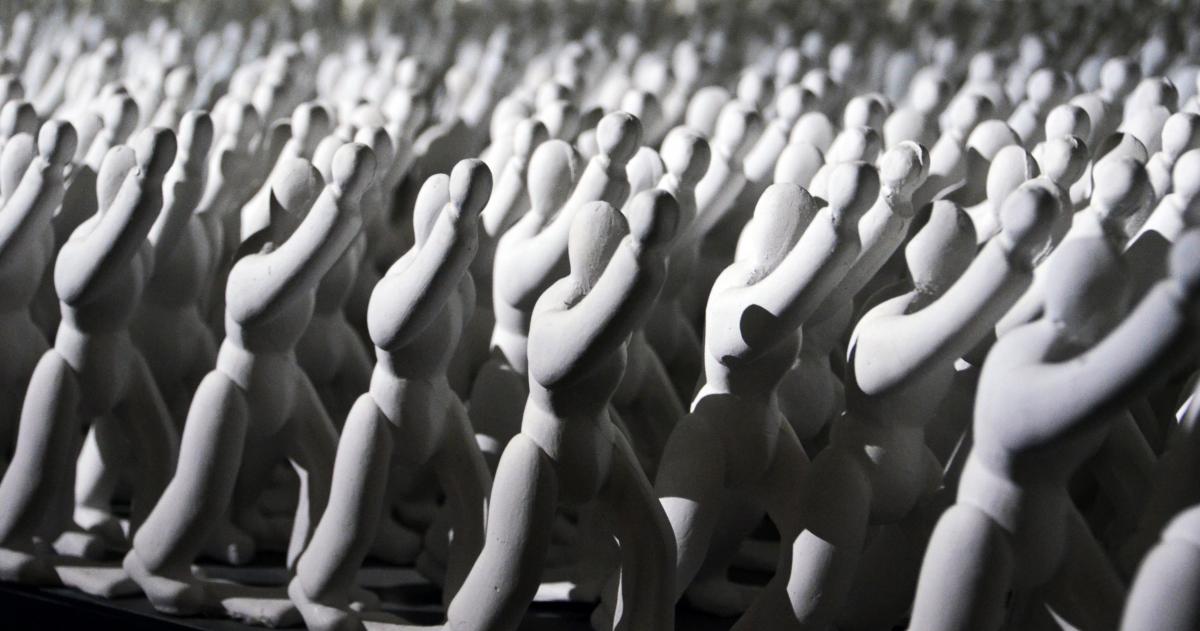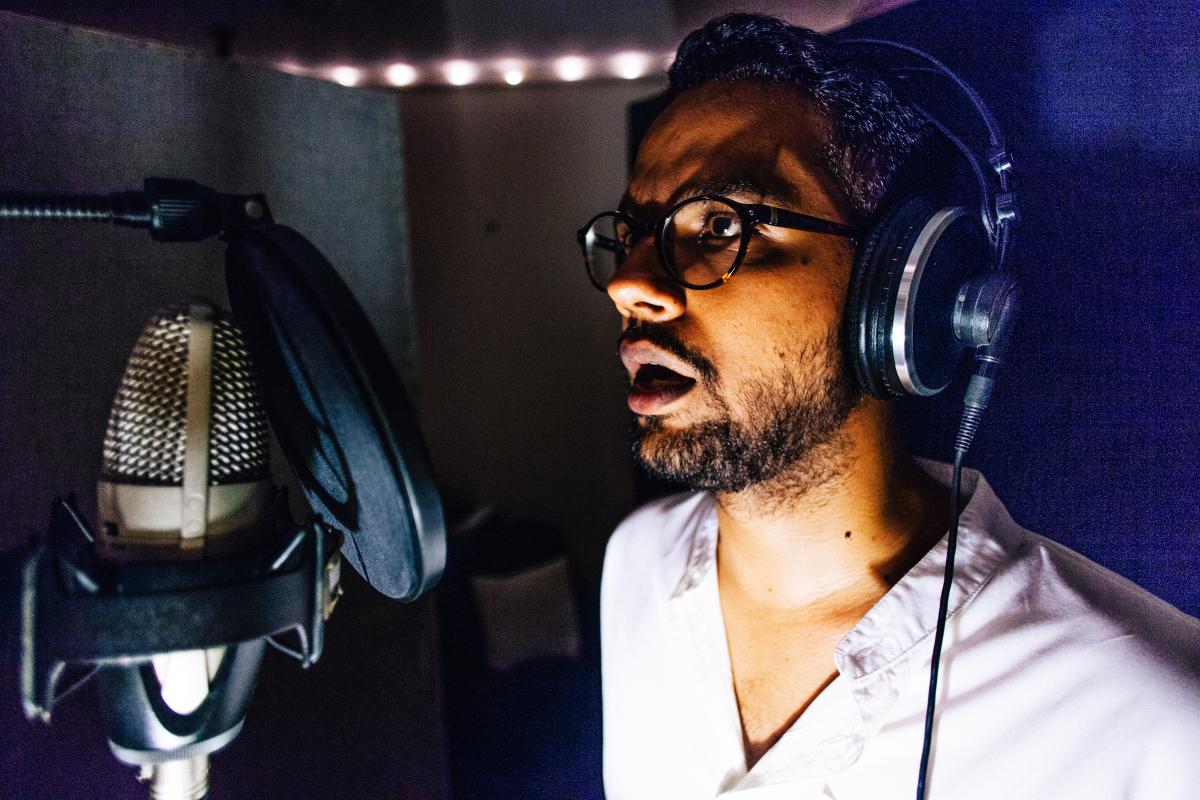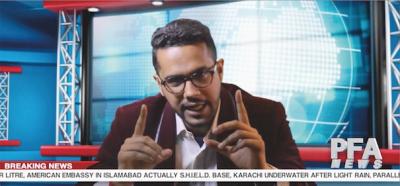Karachi-based rapper and YouTube star Ali Gul Pir wants to be a man who matters. He attacks powerful warlords with satire and opposes the YouTube ban in Pakistan. For this he received death threats. From the Norient book Seismographic Sounds (see and order here).
One Hundred Thousand Views in a Day
[Thomas Burkhalter]: In your video clip «Waderai Ka Beta» you make fun of rich, egoistic, and corrupt feudal lords. Can you translate the song on the spot?
[Ali Gul Pir]: Okay. It goes «Akbar Akbar Jatoi Jal Bani, this is my name, I’m driving a Pajero, and having fun is my game. I am so rich, I fart money, and I will show you now here». Then the chorus is «Waderai Ka Beta», which means «feudal lord’s son». It talks about the feudal system we have in Pakistan. How people in power are doing whatever they like and getting away with it.
[TB]: Everyone in Karachi seems to know you and your song. How did this happen?
[AP]: «Waderai Ka Beta» was my first song. I didn’t have any money, so I borrowed it from friends. With a couple of thousand rupees we produced the song. Satirical rap hasn’t happened yet in Pakistan. So, we were really excited about it and wanted to play it on TV. But neither TV nor radio wanted to air it. They said the song was too controversial. We were kind of disheartened, and we decided to upload it on YouTube – it was June 2012. We released the song on Friday the 14th at 3 pm. We refreshed the page every few minutes and views would go up by hundreds. Within a day we had one hundred thousand views. And within twenty-five days we had one million.
[TB]: Why did it spread so fast?
[AP]: I don’t know really. We shared the video clip on our Facebook pages, and from there it just became crazy. Soon every radio channel was playing it. For the first time, I realized that the people of Pakistan actually have power. They just needed to come together and work towards something. The song was controversial, it was new, but it was true and many could relate to it. This emotion brought everyone together.
[TB]: Later the TV stations started screening your clip too. How important was that?
[AP]: Maybe five percent of people in Pakistan have access to the Internet. Our literacy rate is low, and our education system is messed up. We have big class differences. Poor people can barely buy food, while the rich drive around with big cars. So yes, it was very important that every TV channel and every radio station played it. I ultimately want to speak to the masses. People were transferring the song onto their phones too and were listening to it and watching it, so it trickled down.
«You Don’t Burn the Whole Library»
[TB]: Today, YouTube is banned in Pakistan. You attacked this ban in your video «Kholo BC». Why was this important to you?
[AP]: YouTube is the reason why I am what I am today. So «Kholo BC» was basically about being loyal to YouTube. To ban it was a terrible decision. There were a few videos that the officials did not like; first of all this US-American film called Innocence of Muslims. It depicted our prophet Muhammad in a bad way, and it provoked a big reaction throughout the Muslim world. Many countries banned YouTube. Then, the film was removed from YouTube by the US Supreme Court. Most of the Muslim countries unbanned YouTube except Pakistan, where we have the ban as we speak. But listen, when you don’t like two books in a library, you don’t burn the whole library! There are bad videos on YouTube, sure. You can learn how to build a bomb. But you find important knowledge there too. You can educate yourself. It is up to the user to use it properly. So many people in Pakistan are trying to do something positive. For them YouTube is an important tool.
[TB]: YouTube is still banned. Did «Kholo BC» have some impact?
[AP]: I can’t believe that it didn’t change anything at all. If so, it would make me really sad. We want Pakistani people to start thinking, and not to start giving in on whatever people say. I believe a seed of thought can do wonderful things in the future. We had uploaded the video on Vimeo and the secular progressive Pakistanis started sharing it. It helped to open debate, and that is what art can do, right? Art can never physically unban YouTube, but it can open up your mind and it can present an argument and it can make you think. The first goal was to reach the educated elite, the policy makers. We also tried to reach out internationally. If a Pakistani politician hears about the song on BBC, CNN or Norient, they will take it more seriously, right? If they hear it on local news, they won’t really care. The idea is to create pressure on the government from different organizations that support freedom of expression.
[TB]: The video was produced with money from an NGO. In the Arab World you sometimes hear the argument that so-called «subcultural» musicians are «weapons from the West». Have you heard this argument too?
[AP]: All of my work I have funded myself. I made the money through performing in theaters and through live shows. And yes, I have heard exactly that argument with NGOs. There is this clip on YouTube that says that I’m part of Zionist propaganda. This is stupid because I think I’m talking about the rights of my people, it has nothing to do with an agenda. Many times I have been approached by organizations that offered me money if I would promote their ideas. But I’m not for sale.
[TB]: Pakistan makes headlines because of deadly attacks, the war between the Taliban and the government. And in Karachi many gang-related murders happen every day. What is it like to live there?
[AP]: You want to feel safe, you don’t want to die, but you don’t see any steps towards a safer future. Pakistan is so mixed up: the religious parties, the secular parties, the army, the foreign agencies, India, Afghanistan, Iran – all have their agenda. So people are just trying to live day-by-day. One day I hope to get out of Pakistan and do really hardcore satire on important topics. I can’t do it here. I would be killed in a day or two maximum. I don’t have a bulletproof home, I don’t have a bombproof car. I don’t have security guards, and I also cannot imagine living like that. It is so disappointing that the only way I can help my country is by giving in and moving out. As a person I don’t want to leave. My family is here, I love it here, and I don’t want to give in.
The Occasional Death Threat
[TB]: Were «Waderai Ka Beta» and «Kholo BC» still «safe» videos that didn’t put you in too much danger?
[AP]: In Pakistan, even if you don’t have a dangerous job, you live in danger. Anything can happen anytime. So, if I get some extra danger from my work, it doesn’t really matter. Satire might help a bit: when you wrap something up in humor it is easier to digest. If I said half of the things I said in «Waderai Ka Beta» in a serious way, I would not be here today, I guarantee you. And yes, there is the occasional death threat. A few weeks back my manager received a call from a big politician who wanted to meet me. The manager declined. I can’t meet everyone who calls. The politician then threatened to kidnap me. You know these are people with power and money and nothing to do in life. So I don’t invite everyone to my house; I don’t want people to know where I live. I recently applied for a license to get a gun, you know. I want to keep a gun at home – but is this the right way forward? I’m not a person who likes conflict and violence. But I’m going to get married and I’m going to have a family. I have to protect them, so that’s the one thing that worries me the most.
[TB]: Being an artist in Pakistan, do you feel part of a community, or do you feel rather lonely?
[AP]: Lonely, mostly. Our nation already is lonely and lagging behind. The YouTube ban brought this feeling of loneliness, of being left out as well. As an artist you perform for an audience, and when YouTube was banned, your audience became small. There are also not many people who are doing similar work as me here. The many underground musicians do not get the same attention as I do. So I cannot really talk to many people here who have similar experiences. So yes, it gets lonely. And you have friends abroad. But that's the reality. You have to stay positive.
[TB]: As an artist what do you plan for the future?
[AP]: After my first song I received my first few death threats. I knew I had to make a choice: continue like this or stop? I decided not to go soft. If I speak, I speak my mind and face the repercussions alone. Everyday several people die in my city. One day I might be one of them. I’ll be gone without notice. But you hope that even though you are alone as an artist and you are not as connected to the whole world – and your country is labeled the world’s most dangerous country – you still try to make a difference. Do your bit. Not much, just save the world in your own little way.


















